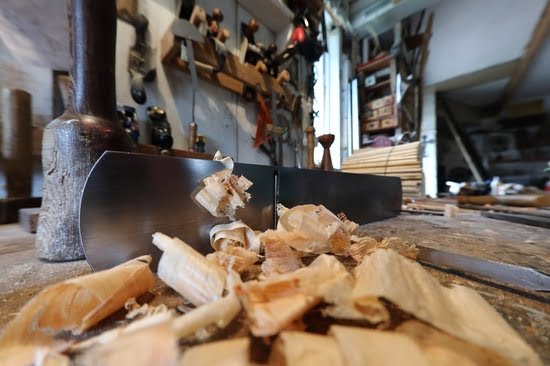Are you interested in pursuing a career in woodworking or simply want to hone your craft? Look no further than the rich tradition of woodworking schools in New England. The region is renowned for its deep history of craftsmanship and has become a hub for woodworking education, offering top-notch programs and resources for aspiring woodworkers. Whether you’re a beginner or an experienced artisan, New England has something to offer everyone with a passion for working with wood.
The history of woodworking in New England dates back to colonial times, where skilled craftsmen played a crucial role in shaping the region’s architectural landscape. From furniture-making to boat-building, the artistry of early woodworkers laid the foundation for the modern-day appreciation of fine craftsmanship. Today, this tradition continues to thrive, with an array of woodworking schools and programs that honor the heritage while embracing contemporary techniques and design concepts.
In this article, we will delve into the fascinating world of woodworking in New England, exploring its historical roots, top-ranking schools and programs, as well as the diverse opportunities available to students and professionals alike. Whether you’re considering enrolling in a program or simply want to immerse yourself in the vibrant woodworking community of New England, we’ve got you covered with everything you need to know about this timeless craft.
The History of Woodworking in New England
One of the defining characteristics of woodworking in New England is its ability to adapt and evolve with the changing times. From the intricate hand-carved details of colonial furniture to the sleek lines of modern designs, woodworkers in the region have always been at the forefront of innovation and creativity. This adaptability has allowed New England woodworking to remain relevant and influential, attracting artisans from all over the world to study and practice their craft in this dynamic environment.
Today, woodworking schools in New England continue this legacy of excellence by offering a comprehensive education that combines traditional techniques with contemporary artistic vision. Students can expect to learn a wide range of skills, from hand tool mastery to computer-aided design, ensuring that they are well-equipped to succeed in an ever-changing industry.
With a focus on both technical proficiency and creative expression, these schools provide a nurturing environment for aspiring woodworkers to hone their craft and develop their own unique style.
| Woodworking Schools | Location |
|---|---|
| North Bennet Street School | Boston, MA |
| Center for Furniture Craftsmanship | Rockport, ME |
| Eliot School of Fine & Applied Arts | Jamaica Plain, MA |
Top Woodworking Schools in New England
Woodworking Schools in New England are renowned for their rich tradition of craftsmanship and artistry. With a long history dating back to the colonial era, woodworking has been an integral part of the culture and heritage of New England. Today, the region is home to some of the top woodworking schools in the country, offering comprehensive programs for aspiring woodworkers.
The Woodworking Schools in New England provide a comprehensive guide for individuals interested in pursuing a career in woodworking. These schools offer a wide range of programs, from traditional woodworking techniques to modern design and fabrication methods. Students have the opportunity to learn from experienced instructors who are passionate about passing on their knowledge and expertise to the next generation of craftsmen.
One of the top woodworking schools in New England is The Center for Furniture Craftsmanship located in Rockport, Maine. This school offers a range of programs including intensive courses, workshops, and a nine-month comprehensive program designed for aspiring professional woodworkers.
Another notable institution is The North Bennet Street School in Boston, Massachusetts, which offers programs in furniture making, carpentry, and preservation carpentry. These schools provide students with hands-on experience and practical skills that are essential for success in the field of woodworking.
Overall, Woodworking Schools in New England offer aspiring woodworkers an invaluable opportunity to hone their craft and develop their skills under the guidance of accomplished artisans. The comprehensive programs, experienced faculty, and supportive community make these institutions ideal places for individuals seeking to pursue a career in woodworking. With a strong emphasis on both traditional craftsmanship and contemporary design, these schools continue to uphold the legacy of woodworking in New England while preparing students for successful careers in the industry.
The Curriculum
Woodworking programs in New England offer a comprehensive curriculum that blends traditional craftsmanship with modern techniques and technology. Students can expect to learn a wide range of skills, from hand tool use to advanced machinery operation, all under the guidance of experienced instructors. The curriculum is designed to provide a well-rounded education that prepares students for success in the woodworking industry.
Hands-on Training
One of the key components of woodworking programs in New England is hands-on training. Students have the opportunity to work on real projects, honing their skills and techniques as they create various woodworking pieces. This practical experience allows students to develop a strong foundation in woodworking and gain confidence in their abilities.
Design Principles
In addition to hands-on training, woodworking programs also emphasize design principles. Students learn about aesthetics, functionality, and form, as well as the history of furniture and woodworking styles. Understanding design principles is crucial for any woodworker, as it influences the quality and marketability of their work.
Business and Entrepreneurship
Many woodworking programs in New England also include courses on business management and entrepreneurship. Students learn how to create a business plan, market their products, manage finances, and operate a successful woodworking business. This aspect of the curriculum equips students with the knowledge and skills needed to pursue their passions while making a living in the industry.
Woodworking schools in New England offer a robust curriculum that provides students with a solid foundation in traditional craftsmanship, design principles, and business management. By combining practical experience with theoretical knowledge, these programs prepare graduates for successful careers as professional woodworkers or entrepreneurs in the field.
Alumni Success Stories
Woodworking schools in New England have consistently produced alumni who go on to have successful careers in the woodworking industry. These individuals have not only honed their skills at these institutions but have also become influential figures within the woodworking community. Their stories serve as inspiration for current and prospective students, showcasing the possibilities that await them after completing their education.
Notable Alumni Achievements
Many alumni from woodworking schools in New England have achieved great success in their careers. From founding their own woodworking businesses to gaining recognition for their artistry, these individuals have made significant contributions to the field. Some have been featured in prominent exhibitions and publications, while others have been commissioned for prestigious projects. The success of these alumni highlights the quality of education and training provided by woodworking schools in New England.
Impact on the Woodworking Community
The achievements of alumni from woodworking schools in New England extend beyond individual successes; they also contribute to the growth and development of the woodworking community in the region. Through their work, these alumni promote the art of woodworking, inspire emerging craftsmen, and create opportunities for collaboration and mentorship. Their involvement in workshops, exhibitions, and community events helps to enrich the cultural landscape of New England and strengthen the bond among woodworkers.
Advice for Aspiring Woodworkers
For aspiring woodworkers considering attending a school in New England, hearing about the career trajectories of successful alumni can be invaluable. Their stories provide insight into different paths within the industry and offer encouragement for those embarking on their own journeys. From pursuing specialized niches to balancing artistic expression with entrepreneurial endeavors, these success stories offer valuable lessons and inspiration for students seeking to make their mark in the world of woodworking.
Beyond the Classroom
When it comes to pursuing a career in woodworking, hands-on experience is invaluable. Thankfully, woodworking schools in New England offer a variety of opportunities for students to gain practical skills beyond the traditional classroom setting. From workshops and internships to networking events, these programs provide a comprehensive approach to learning the craft of woodworking.
Workshops
Woodworking schools in New England often organize workshops that allow students to learn from experienced craftsmen and artisans. These workshops cover a range of topics, from traditional joinery techniques to advanced wood carving methods. Participating in these workshops not only enhances students’ skills but also exposes them to different perspectives and approaches within the woodworking community.
Internships
Many woodworking schools in New England have established partnerships with local furniture makers, carpentry businesses, and design studios, offering students the opportunity to participate in internships. These real-world experiences enable students to apply their knowledge in a professional setting, gain hands-on skills, and build their portfolios. Additionally, internships can often lead to employment opportunities and valuable industry connections.
Networking Opportunities
Networking is essential for aspiring woodworkers looking to establish themselves in the industry. Woodworking schools often host events such as career fairs, guest lectures by industry professionals, and alumni gatherings, providing students with valuable networking opportunities. Building relationships with fellow students, instructors, and established professionals can open doors for future collaborations, mentorships, and job prospects within the woodworking community.
Overall, beyond the classroom experiences play a crucial role in shaping well-rounded woodworkers who are prepared for success in the industry after completing their education at woodworking schools in New England.
The Woodworking Community in New England
Woodworking schools in New England not only provide excellent education and training but also offer a myriad of events, exhibitions, and resources for craftsmen to further hone their skills and network with other professionals in the industry. Whether you are a seasoned woodworker or just starting out, there are plenty of opportunities to immerse yourself in the vibrant woodworking community in New England. Here are some of the events, exhibitions, and resources available to craftsmen in the region:
- Annual Woodworking Events: New England hosts several annual woodworking events that bring together craftsmen from all over the region. These events often feature workshops, demonstrations, and vendor booths where attendees can explore the latest tools and techniques in woodworking.
- Woodworking Exhibitions: Throughout the year, there are various woodworking exhibitions showcasing the work of talented artisans and students from woodworking schools in New England. These exhibitions are great opportunities to gain inspiration, learn from different styles and approaches, and even purchase unique handcrafted pieces.
Conclusion
In conclusion, the rich tradition of woodworking in New England continues to thrive through the top woodworking schools in the region. The history of woodworking in New England, from colonial craftsmanship to modern artistry, has laid a strong foundation for these educational institutions to carry on the legacy of excellence in craftsmanship.
The curriculum offered by woodworking schools in New England provides students with a comprehensive understanding of woodworking techniques, design principles, and business practices, ensuring that they are well-equipped for successful careers in the field.
Moreover, the success stories of alumni from woodworking schools in New England serve as testament to the quality education and training provided by these institutions. Graduates have gone on to launch successful careers as furniture makers, woodworkers, and artisans, contributing to the thriving woodworking community in New England. Additionally, beyond the classroom, students have access to workshops, internships, and networking opportunities that further enhance their skills and connections within the industry.
Aspiring woodworkers in New England can also look forward to being part of a vibrant community with various events, exhibitions, and resources available for craftsmen. These gatherings provide an avenue for woodworkers to showcase their work, exchange ideas with fellow craftsmen, and stay updated on the latest trends and innovations in woodworking.
With its rich history and commitment to preserving traditional craftsmanship while embracing modern techniques, it is clear that woodworking schools in New England play a crucial role in nurturing future generations of skilled artisans who will continue to contribute to this timeless craft.
Frequently Asked Questions
How Many Years of College Do You Need for Woodworking?
The number of years of college needed for woodworking can vary. Some individuals may pursue a two-year associate degree in woodworking or a related field, while others may choose to pursue a four-year bachelor’s degree in fine arts or industrial design with a focus on woodworking.
What Is the Best Way to Learn Woodworking?
The best way to learn woodworking is often through a combination of formal education, hands-on experience, and mentorship. Taking classes at a trade school or community college, apprenticing with experienced woodworkers, and practicing on your own are all valuable ways to develop skills in woodworking.
Is There a Masterclass on Woodworking?
Yes, there are masterclasses available on woodworking. Many skilled woodworkers offer online courses and tutorials covering various aspects of woodworking, such as joinery techniques, furniture making, and woodturning. These masterclasses can provide valuable insights and instruction for both beginners and experienced woodworkers alike.

Hi everyone! I’m a woodworker and blogger, and this is my woodworking blog. In my blog, I share tips and tricks for woodworkers of all skill levels, as well as project ideas that you can try yourself.





